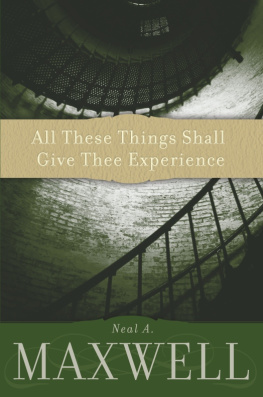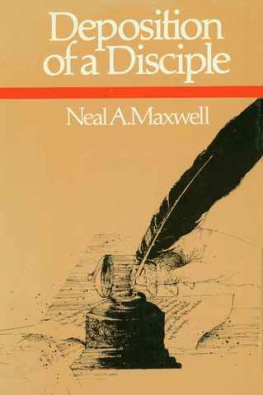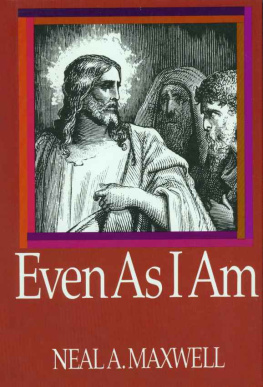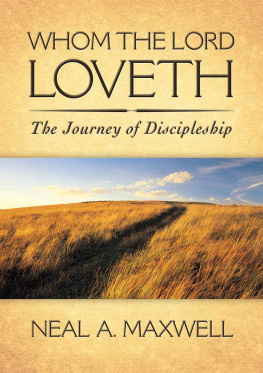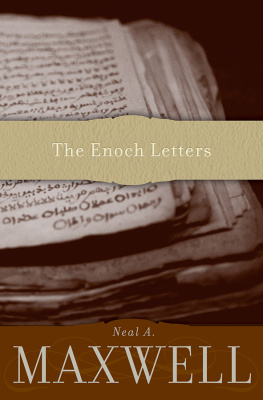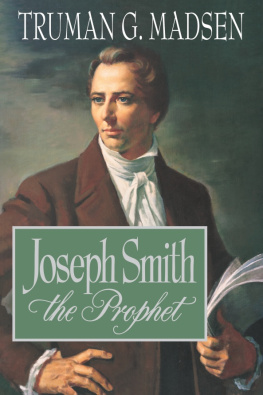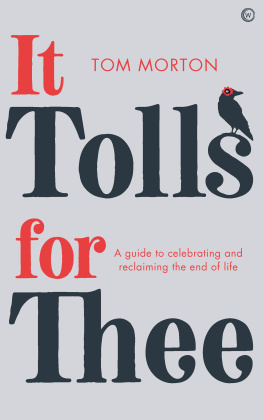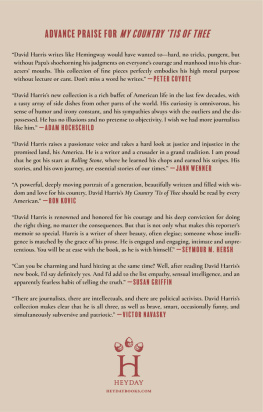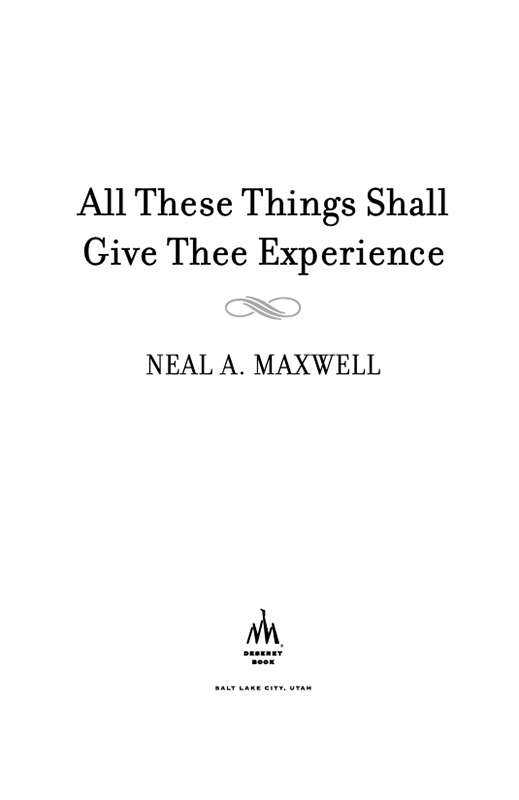2009 Neal A. Maxwell.
All rights reserved. No part of this book may be reproduced in any form or by any means without permission in writing from the publisher, Deseret Book Company, P.O. Box 30178, Salt Lake City Utah 30178. This work is not an official publication of The Church of Jesus Christ of Latter-day Saints. The views expressed herein are the responsibility of the author and do not necessarily represent the position of the Church or of Deseret Book. Deseret Book is a registered trademark of Deseret Book Company.
DESERET BOOK is a registered trademark of Deseret Book Company.
Visit us at DeseretBook.com
First printing in hardbound 1979
First printing in paperbound 1998
First printing in redesigned paperbound 2007
eBook 2009
eISBN 9781606412800
To Richard Sharp and other dear friends for whom release from this life came through cancer; who showed loved ones and friends how to die as well as how to live.
_______
Also to David Silvester and others who valiantly struggle stillbut in a salute to life as they endure and come to know "the fellowship of his sufferings."
Acknowledgments
It is difficult to say thanks in new ways. Further, the terse expressions of gratitude usually reserved for pages like this bear no relationship to the significant help given.
Those who patiently gave of their time and commentary in helping the author so much with this volume, each making a special, though different, contribution, included Commissioner Jeffrey Holland, President Bruce Hafen, Roy W. Doxey, and Elizabeth Haglund.
Dealing as they did with an early draft was the equivalent of seeing the author early in the morning when he was not quite "with it." They persisted, encouraged, and contributed. I express deep appreciation for their help in this attempt to discuss some hard doctrines.
Lowell Durham and his associates gave candid commentary too, and Eleanor Knowles, in particular, performed well the painstaking tasks of editing, checking, and indexingand this in the context of her other important tasks. Jeananne Gruwell made readable the author's evening labors so that all of the above could play their part.
Preface
Books are born in many ways, though they inevitably reflect the author. In the instance of this volume, several shaping experiences led to its creation.
Watching, for instance, new converts (who are often so soon tested) become "Church broken" caused a fresh pondering about spiritual growth, both its pain and its beauty.
Trying to respond to recurring questions about God and how much He knows created a resolve to attempt some clarifying comments on the omniscience of God, a reality the acceptance of which is such a fundamental part of real faith.
Comments by helpful and thoughtful colleagues, who did not even realize they were being helpful, induced some deeper thinking about the role corrective commentary plays in one's growth. One beloved colleague, upon hearing a clever but somewhat cutting comment by the author about a certain situation, gave mild reproof in the form of "You could have gone all day without saying that." Deftly done. Lovingly done. Remembered.
The specific and loving responsiveness of members of the First Quorum of the Seventy to a presentation on brotherhood underscored the relevancy of brotherhood to personal growth.
Hearing others expound on the scriptures and being surprised when they opened up insights that have escaped me: Elder Marion D. Hanks did such a thing in noting the words about what a marvelous leader Moroni was (see Alma 48:11-20), but stressing the less noted words about others of the Brethren, such as Helaman, who "were no less serviceable unto the people than was Moroni." This was a wise and important insight in the Book of Mormon that had gone unnoticed in spite of many readings.
Dr. Allen Bergin helped without knowing it in a significant conversation about suffering.
Seeing the quiet example of others, such as President and Sister Spencer W. Kimball, ceaselessly implementing "pure religion," served as a reminder about the relentless requirements of service, especially in selfish times like these.
A noticing and caring wife urged that the often unanswered or poorly answered concerns of others be responded to in better ways than in my first attempts in conversations heard by her. She knew there were better answers.
Perhaps more than anything, however, the gallant and even gracious suffering of friends with different forms of cancer led to the effort on the role of suffering in the second estate, a most difficult doctrine, and yet so vital for us all. It is to these friends that this volume is dedicated.
Hard Doctrines and God's Love
When one decides whether or not to deal with hard doctrines, the tendency is to put them off or to be put off by them. Not only are they in some respects puzzling, but they may even offend our mortal pride. Just as there are some good deeds we do gladly and quickly (while others are put off time and again), so it is with certain gospel truths: we accept some with joy and alacrity, but others we keep at arm's length. The hardness is usually not in their complexity, but in the deep demands these doctrines make of us. They are actually harder to accept than to understand, for there is a breathtaking simplicity about them.
Why, therefore, is the resistance to them so often present? Is it a lack of humility? Or, once accepted, is it that these truths carry unwanted implications and heavy responsibilities with them? Is it because we are not yet ready? Is it that these truths seem almost too much to comprehend? Probably it is all of these. Therefore, it is not because we refuse even to think about these doctrines; rather, it is that when we have explored them somewhat, we return from such a brief reconnaissance less than anxious to make further sorties in that direction. This is a pity, however, because our adoration for and appreciation of God will be measurably increased as we increase our understanding of Him and His plan of happiness.
Meanwhile, do we nevertheless feel somehow diminished by the reality of the omniscience of God? Does His foreknowledge (which grows out of His omniscience) seem to make us less significant or less free? Does the perfect predictability of our behavior (in God's eyes) seem to squeeze out some of the sense of adventure in mortality? And if so, do we childishly want to play-act just a little longerrisking righteousness and true happiness merely in order to be reassured about our independence?
Since, alas, a holding back regarding the hard doctrines does seem to be characteristic, why don't we at least resist equally the gravitational pull coming from the other direction? The adversary would claim us, too! Somehow he gets away with it, even though his way is monotony masquerading as individuality, and even though the selfishness he encourages is merely an apostate individualism.
Would that we might worry as much about being taken for granted by Lucifer (or be as concerned with freedom from sin) as we sometimes are about opting for the Lord. Besides, if it is real adventure we want, there is none of it in wickedness. Perhaps the tilt to the telestial occurs because many feel less compromised when they are led carefully down the paved, gently descending, wide way, on which there is no exhilaration, whereas in climbing up the straight and narrow way, one seems to notice every chuckhole and all the loose gravel.
In any event, to ignore the hard doctrines deprives us of much-needed doctrinal rations for the rigorous journey.
The lyrics "Come, let us anew our journey pursue" (Hymns, no. 17) suggest getting on with our impending mortal experiences, some of the most glorious of which will be adventures of the mind and heart as we ponder and explore new truthstruths that both penetrate us and envelop us. How can we, for instance, develop even a beginner's appreciation for God's omniscience, if we do not have a measure of understanding for His perfect love? Can we ponder His ultimate brilliance, if we do not commence to feel His ultimate warmth?

